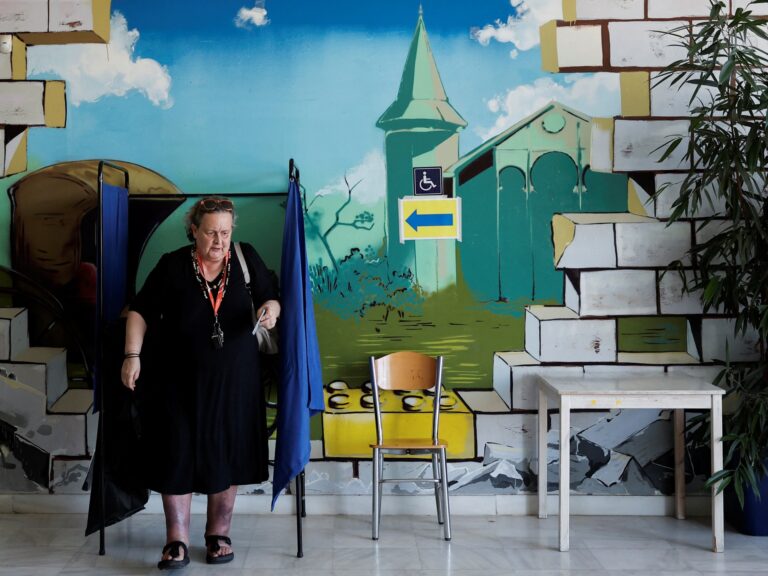The election will shape how the European Union confronts challenges including a hostile Russia, growing industrial competition from China and the United States, climate change and migration.
Voters in the 20 European Union nations have begun electing their next parliaments amid an escalating war in Ukraine, rising anti-immigrant sentiment and concerns that a shift to the political right could undermine the world’s largest trading bloc’s decision-making ability.
Elections began in the Netherlands on Thursday and in other countries on Friday and Saturday, but the majority of EU votes will take place on Sunday, with France, Germany, Poland and Spain opening polls and Italy holding a second day of voting to elect the country’s 720 members of the European Parliament.
Parliamentary seats are apportioned based on population, ranging from six in Malta and Luxembourg to 96 in Germany.
The election will shape how the European Union confronts challenges including a hostile Russia, growing industrial competition from China and the United States, climate change and migration.
Unofficial exit polls on Thursday suggested Geert Wilders’ far-right anti-immigration party would make strong gains in the Netherlands, even if a coalition of pro-European parties relegated it to second place.
Since the last EU elections in 2019, populist or far-right parties have come to power in three countries – Hungary, Slovakia and Italy – and are part of governing coalitions in others, including Sweden, Finland and soon the Netherlands. Opinion polls show populist parties leading in France, Belgium, Austria and Italy.
The election comes at a trying time for the confidence of voters in the EU of about 450 million people, which over the past five years has been rocked by the coronavirus pandemic, economic recession and an energy crisis sparked by the war in Ukraine, Europe’s biggest territorial conflict since World War II.
The vote also marks the start of a period of uncertainty for Europe and its international partners. Beyond the struggle to form political groups and alliances in parliament, national governments will compete to secure top EU positions for their national officials.
The most important of these is the presidency of the European Commission, a powerful executive body that proposes laws and ensures that they are followed. The Commission also holds the EU’s purse strings, regulates trade and is Europe’s competition watchdog.
Other senior posts include the President of the European Council, who presides over summits of presidents and prime ministers, and the Chief of EU Foreign Policy, the EU’s top diplomat.
MEPs have a say on a wide range of laws, from financial regulation to climate and agricultural policy, and they also approve the EU budget, which funds the EU’s political priorities as well as infrastructure projects, farm subsidies and aid to Ukraine.
But despite its important role, political campaigns are often focused on individual national concerns rather than broader European interests, with voters routinely voting in protest against the policies of their own governments.
The survey found that mainstream and pro-European parties will maintain majorities in parliament, but that the far-right, including parties led by politicians such as Wilders and France’s Marine Le Pen, are expected to lose seats.
The largest political group, the centre-right European People’s Party (EPP), has already distanced itself from the centre and is campaigning on a traditional far-right agenda of increased security, tougher immigration laws and a preference for business over social welfare.
Much will depend on whether the ruling party of populist far-right Prime Minister Giorgia Meloni, Brothers of Italy, with its neo-fascist roots, stays with the more hardline European Conservatives and Reformists (ECR) or joins a new far-right grouping that may be formed after the elections. Meloni also has the further option of cooperating with the European People’s Party (EPP).
The second-largest group, the center-left Socialists and Democrats, as well as the Greens, have rejected any cooperation with the PES. It would be an even more dire scenario for the pro-European parties if the PES were to join forces with Le Pen’s Identity and Democracy party to strengthen the influence of the far-right.
Questions remain about which group will be joined by Hungarian Prime Minister Viktor Orban’s staunchly nationalist, anti-immigration Fidesz party, which was previously part of the European People’s Party but was forced to leave in 2021 due to conflicts over interests and values.
The European People’s Party is campaigning for Ursula von der Leyen to serve a second term as European Commission president, but even if the party wins there is no guarantee she will be re-elected: Parliament must approve a candidate, but national leaders will decide who is nominated.

